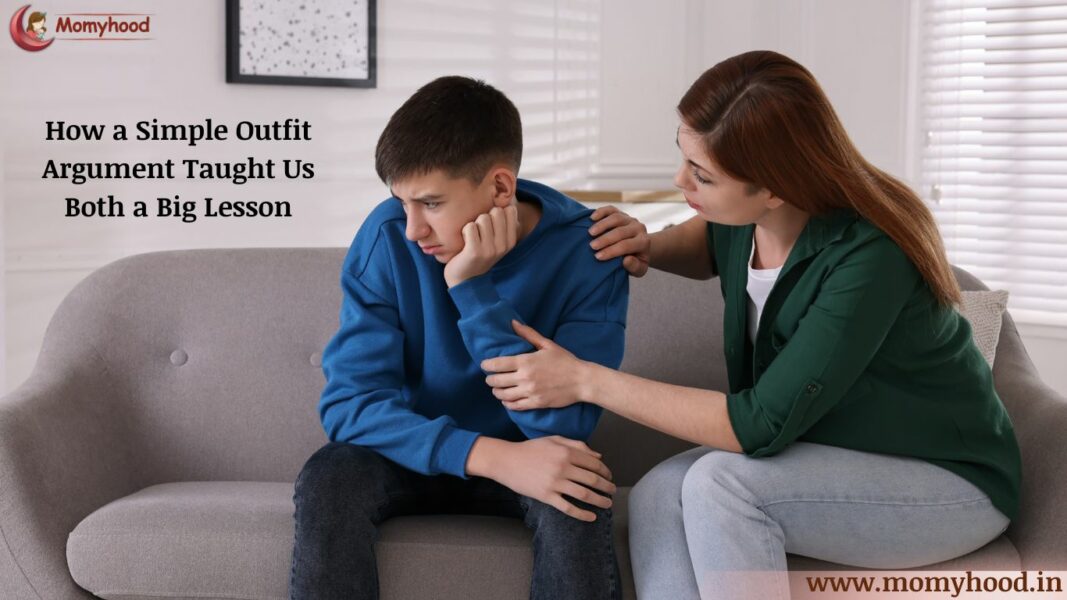Being a mom to a teenager can sometimes feel like walking a tightrope. Just when you think you’ve got everything figured out, a little misunderstanding can throw you off balance. Recently, I had one of those moments with my 14-year-old son, Kiyansh, and it turned into a big lesson for both of us about what parenting a teenager truly means.
The Incident: A Parenting Misunderstanding with My Teenage Son
It all started on a Friday evening. Kiyansh was bubbling with excitement because he had plans to go out with his friends. I could see how thrilled he was, and honestly, I was happy for him. But as he was getting ready, I noticed the outfit he chose—a casual t-shirt and ripped jeans. To me, it seemed too informal for a gathering, especially since it was at a friend’s house where some parents would be present.
So, I casually suggested he change into something a bit nicer. That’s when things took a turn. Kiyansh’s face fell, and he snapped back at me, insisting that his outfit was perfectly fine and that all his friends would be dressed similarly. The excitement in the room quickly turned to tension. It wasn’t just about the clothes anymore—it felt like a clash of values and respect.
Why Conflicts Arise in Parenting a Teenager
Teen Independence and Identity
Kiyansh, at 14, is in a phase where he is testing boundaries and seeking more independence. To him, the outfit was a form of self-expression, and my suggestion felt like a challenge to his autonomy.
Miscommunication Between Parent and Teen
My intention was to help him make a good impression, but I didn’t clearly communicate that. Instead, my comment was interpreted as criticism, which triggered his defensive reaction.
Also read: Social Media for Teens: How to Set Healthy Limits Without Backlash
Emotional Reactions in Teen Years
For Kiyansh, the moment was about fitting in and asserting his identity. My suggestion felt like an attack on his personal choice, intensifying his emotional response.
📣 Loved what you read? Want to go deeper into conscious parenting? ✨ The Power of Manifestation in Parenting is now available — A soulful guide packed with real-life tools like affirmations, energy shifts, and sleep talk that I personally use with my son, Hitarth. 💛 Start your journey toward calmer, connected parenting today. 🎉 Launch Offer: Only ₹99 (limited-time price!) 📲 Instant download. No waiting. 👉 Grab your copy now!.
How We Resolved It: Real Lessons in Parenting a Teenager
1. Cooling Down First
After the argument, both of us needed time apart. I found myself pacing in the kitchen, while Kiyansh retreated to his room. It was clear that we needed a break to gain perspective.
2. Reopening the Conversation Gently
Later, I knocked on his door and asked if we could talk. When he agreed, I approached the conversation with empathy. I started by acknowledging his feelings:
“I understand you were excited to go out, and my comment might have seemed like an unwarranted criticism.”
3. Listening to Understand, Not React
Kiyansh shared how important his style was to him and how my words felt like an attack. I explained that I wasn’t trying to judge him but simply help him present himself well socially.
4. Finding a Win-Win Compromise
We agreed that he could wear what he feels confident in, but if he’s unsure or if there’s a concern, we’ll talk about it beforehand. This small agreement strengthened our bond and gave both of us clarity.
5. Ending with Reconnection
We hugged it out. That simple act felt like a reset. Parenting a teenager isn’t about control—it’s about connection.
Related read: Child Psychologist’s Advice On Teen Parenting Goes Viral
Practical Tips for Parenting a Teenager Through Daily Conflicts
Communicate Clearly and Kindly
Avoid vague statements. Say, “I think a slightly dressier outfit might be better since parents will be there,” instead of “This isn’t appropriate.”
Practice Active Listening
Let your teen express their view completely before responding. Often, they just want to feel heard.
Set Guidelines Together
Discuss rules collaboratively. Teens value being involved in decisions—it makes them feel respected.
Be Patient and Empathetic
Remember, adolescence is a rollercoaster. Your calm presence can help stabilize emotional waves.
Encourage Open Dialogue
Create a home where they’re not afraid to come to you with questions, confessions, or problems.
Conclusion: Parenting a Teenager is About Growing Together
This small misunderstanding with Kiyansh was actually a huge step forward in our relationship. It reminded me that parenting a teenager isn’t just about guiding them — it’s about understanding them, too. Conflicts are normal. What really matters is how we handle them.
If you’re a parent navigating the ups and downs of raising a teen, remember: patience, empathy, and open communication are your best tools. Parenting a teenager can be challenging, but it’s also one of the most rewarding journeys—full of learning, love, and growth for both parent and child.
Your comments and shares do more than just support our blog—they uplift the amazing moms who share their stories here. Please scroll down to the end of the page to leave your thoughts, and use the buttons just below this line to share. Your support makes a big difference!



